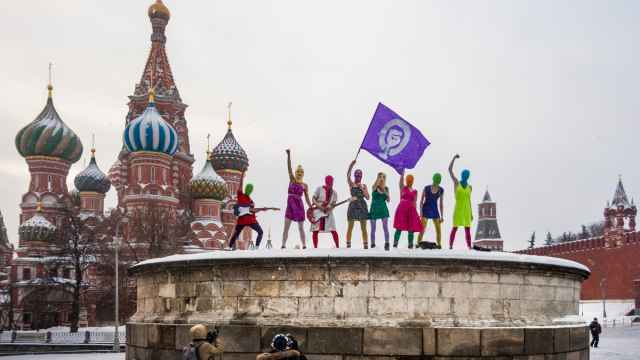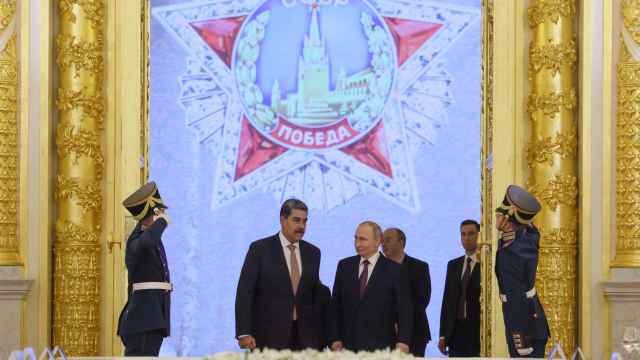I was watching the U.S.-Russia Olympic hockey game in my Moscow apartment last weekend when an American referee overturned a potentially game winning goal for Russia. It would have put Russia ahead 3-2 in the closing minutes of the final period. The goal, showed in slow motion from various angles, was ruled out on a technicality.
I immediately knew it would be one of those moments I'd have to answer for as a U.S. expat working in Moscow. I started getting phone calls before the game was over and, sure enough, on Monday I was barraged with questions from my Russian colleagues and students. I was even jokingly met with some cold, angry stares. I anticipate such reactions for at least a week, if not longer.
You see, I was a volunteer at the Salt Lake Winter Olympics in 2002. I helped set up for the opening ceremony as well as the snowboarding events, where I was stationed throughout the Olympics. Although I wore a "Я говорю по-русски" translator pin, there were very few Russian spectators to translate for. Snowboarding had not really caught on yet, and only one Russian female snowboarder even competed in the events.
Those Olympic Games had many amazing moments and highlights, including the closing ceremony that I was fortunate enough to attend. Almost invariably, however, when the Salt Lake Olympics come up in conversation, the first thing most Russians remember are the figure-skating judging scandals, which unfortunately later proved to be true.
I would have preferred almost any other outcome to that hockey game, a convincing U.S. or Russian victory, to the one that happened. That particular moment was endlessly discussed on various sports and news programs afterwards. Most experts, apparently including the U.S. coach, did not understand the international rule that was upheld. The countless fans watching the game understood even less. The goal would have been counted by National Hockey League rules.
I can appreciate just how suspicious it looked on live television when the American referee skated to the side, talked on the phone for a few minutes and then came out with his arms swinging sideways, indicating the goal would not be counted. It doesn't matter that the person on the other end of that call was a Russian official. The damage had been done. The stereotype of Americans pulling strings behind the scenes to get their way had been reinforced, quite strongly and on live television.
The government-controlled Russian television channels already seem to be making a concerted effort to make the general population believe a lot of absurd things about America's intentions in this country. They don't need any help. It is unfortunate how ready the citizens of our two countries are to believe negative things about each other, a sad legacy of disinformation and gloating left over from the Cold War.
Last week I had to assure my mother in the U.S. that no one was killed for the Olympic ring malfunction that occurred during the opening ceremony. Her worries stemmed from an Internet rumor that went viral. It is hard to believe so many people initially fell for this, including some U.S. television commentators. Would people have been so easily taken in if such a rumor had been spread about Canada when it had a similar mishap during the Vancouver Olympics ceremony in 2010? Of course not. Russia and Canada have very different histories and reputations. The old saying goes that a good reputation takes years to build but can be broken in an instant. This, however, is more true for individuals and definitely not true when discussing cultural stereotypes.
There have been plenty of problems and "only in Russia" moments discussed by foreign journalists visiting Sochi. I am happy to see some positive stereotypes, such as those of Russian hospitality and generosity, being pointed out by the media as well.
In the bigger picture, of course, some goals are more important than the one discounted last weekend. The Olympic movement's stated goal of promoting "mutual understanding with a spirit of friendship, solidarity and fair play" come to mind. As a sports fan, I hope that both Russia and the U.S. win as many medals as possible during these Olympics. My greater hope outside these competitions, however, is for an end to the outdated zero-sum mentality where winning doesn't necessarily mean the other losing.
Nathan Eyre is a Moscow-based translator and teacher.
A Message from The Moscow Times:
Dear readers,
We are facing unprecedented challenges. Russia's Prosecutor General's Office has designated The Moscow Times as an "undesirable" organization, criminalizing our work and putting our staff at risk of prosecution. This follows our earlier unjust labeling as a "foreign agent."
These actions are direct attempts to silence independent journalism in Russia. The authorities claim our work "discredits the decisions of the Russian leadership." We see things differently: we strive to provide accurate, unbiased reporting on Russia.
We, the journalists of The Moscow Times, refuse to be silenced. But to continue our work, we need your help.
Your support, no matter how small, makes a world of difference. If you can, please support us monthly starting from just $2. It's quick to set up, and every contribution makes a significant impact.
By supporting The Moscow Times, you're defending open, independent journalism in the face of repression. Thank you for standing with us.
Remind me later.





